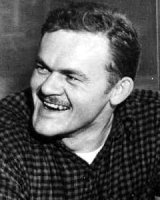James Jones (author)
| James Jones | |
|---|---|
 |
|
| Born | James Ramon Jones November 6, 1921 Robinson, Illinois, U.S. |
| Died | May 9, 1977 (aged 55) Southampton, New York, U.S. |
| Occupation | Novelist, author |
| Nationality | American |
| Period | 1951–1975 |
| Genre | World War II fiction |
| Notable awards |
National Book Award 1952 |
| Military career | |
| Allegiance | |
| Service/branch |
|
| Years of service | 1939–1944 |
| Rank |
|
| Unit | |
| Battles/wars | World War II |
| Awards |
|
James Jones (November 6, 1921 – May 9, 1977) was an American novelist known for his explorations of World War II and its aftermath. He won the 1952 National Book Award for his first published novel, From Here to Eternity, which was adapted for the big screen immediately and made into a television series a generation later.
James Ramon Jones was born and raised in Robinson, Illinois, the son of Ramon and Ada M. (née Blessing) Jones. He enlisted in the United States Army in 1939 at the age of 17 and served in the 25th Infantry Division 27th Infantry Regiment before and during World War II, first in Hawaii at Schofield Barracks on Oahu, then in combat on Guadalcanal at the Battle of Mount Austen, the Galloping Horse, and the Sea Horse, where he injured his ankle. He returned to the US and was discharged in July 1944. He also worked as a journalist covering the Vietnam War.
His wartime experiences inspired some of his most famous works, the so-called war trilogy. He witnessed the Japanese attack on Pearl Harbor, which led to his first published novel, From Here to Eternity (1951). The Thin Red Line (1962) reflected his combat experiences on Guadalcanal and Whistle (posthumous, 1978) was based on his hospital stay in Memphis, Tennessee, recovering from surgery on an ankle he had reinjured on the island.
...
Wikipedia
